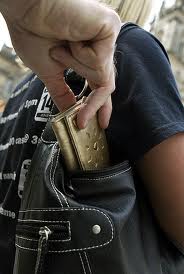Robbery
 Penal Code Section 211 States:
Penal Code Section 211 States:
“Robbery is the felonious taking of personal property in the possession of another, from his person or immediate presence, and against his will, accomplished by means of force or fear.”
Many robbery crimes include guns and weapons crimes, including armed robbery using guns, knives and other dangerous objects. Use of a weapon or infliction of great bodily injury during the commission of a robbery carries a stricter sentence. Robbery involves person to person confrontation, the threat of or use of force along with the intent to coerce and prevent resistance.
Anyone convicted of robbery in the first degree could face up to nine years in state prison.
Second-degree robbery carries up to five years.
A robbery conviction is very serious. If convicted of multiple counts, a life sentence is possible.
If the accused is not a United States citizen, his or her immigration status or application for citizenship will be in jeopardy if convicted of robbery.
ROBBERY: What the Prosecutor Must Prove Beyond a Reasonable Doubt
Jury Instruction 1000. Robbery
The defendant is charged [in Count ] with robbery [in violation of Penal Code section 211].
To prove that the defendant is guilty of this crime, the People must prove that:
1. The defendant took property that was not (his/her) own;
2. The property was taken from another person’s possession and immediate presence;
3. The property was taken against that person’s will;
4. The defendant used force or fear to take the property or to prevent the person from resisting;
[AND]
5. When the defendant used force or fear to take the property, (he/she) intended (to deprive the owner of it permanently/ [or] to remove it from the owner’s possession for so extended a period of time that the owner would be deprived of a major portion of the value or enjoyment of the property).
The defendant’s intent to take the property must have been formed before or during the time (he/she) used force or fear. If the defendant did not form this required intent until after using the force or fear, then (he/she) did not commit robbery.
<Give the following bracketed paragraph if the second degree is the only possible degree of the charged crime for which the jury may return a verdict.>
[If you find the defendant guilty of robbery, it is robbery of the second degree.]
[A person takes something when he or she gains possession of it and moves it some distance. The distance moved may be short.]
[The property taken can be of any value, however slight.] [Two or more people may possess something at the same time.]
[A person does not have to actually hold or touch something to possess it. It is enough if the person has (control over it/ [or] the right to control it), either personally or through another person.]
[A (store/ [or] business) (employee/ <insert description>) who is on duty has possession of the (store/ [or] business) owner’s property.]
[Fear, as used here, means fear of (injury to the person himself or herself[,]/ [or] injury to the person’s family or property[,]/ [or] immediate injury to someone else present during the incident or to that person’s property).]
[Property is within a person’s immediate presence if it is sufficiently within his or her physical control that he or she could keep possession of it if not prevented by force or fear.]
[An act is done against a person’s will if that person does not consent to the act. In order to consent, a person must act freely and voluntarily and know the nature of the act.]
[Fear, as used here, means fear of (injury to the person himself or herself[,]/ [or] injury to the person’s family or property[,]/ [or] immediate injury to someone else present during the incident or to that person’s property).]
[Property is within a person’s immediate presence if it is sufficiently within his or her physical control that he or she could keep possession of it if not prevented by force or fear.]
[An act is done against a person’s will if that person does not consent to the act. In order to consent, a person must act freely and voluntarily and know the nature of the act.]
If you or someone you know has been charged with Robbery, contact John J. Stanley & Associates at (818) 769-5200 for your free consultation.
